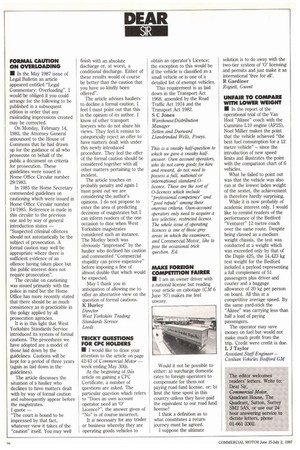FORMAL CAIITION ON OVERLOADING • In the May 1987 issue
Page 30

If you've noticed an error in this article please click here to report it so we can fix it.
of Legal Bulletin an article appeared entitled "Legal Commentary: Overloading". I would be obliged if you could arrange for the following to be published in a subsequent edition in order that any misleading impressions created may be corrected.
On Monday, February 14, 1983, the Attorney General announced to the House of Commons that he had drawn up for the guidance of all who prosecute on behalf of the public a document on criteria for prosecution. These guidelines were issued in Home Office Circular number 29/1983.
In 1985 the Home Secretary commended guidelines on cautioning which were issued in Home Office Circular number 14/1985. Reference is made in this circular to the previous one and by way of general introduction states — "Suspected criminal offences should not automatically be the subject of prosecution. A formal caution may well be appropriate where there is sufficient evidence of an offence having taken place but the public interest does not require prosecution".
The circular on cautioning was issued primarily with the police in mind but the Home Office has more recently stated that there should be as much consistency as is practicable in the poligy applied by all prosecution agencies.
It is in this light that West Yorkshire Standards Service introduced its system of formal cautions. The procedures we have adopted are a model of those laid down by the guidelines. Cautions will be kept for a period of three years (again as laid down in the guidelines).
The article discusses the situation of a haulier who declines to have matters dealt with by way of formal caution and subsequently appear before the magistrates.
I quote — "The court is bound to be impressed by that fact, whatever view it takes of the "caution" itself. You may well finish with an absolute discharge or, at worst, a conditional discharge. Either of these results would of course be better than the caution that you have so kindly been offered".
The article advises hauliers to decline a formal caution. I feel I must point out that this is the opinion of its author. I know of other transport lawyers who do not share his views. They feel it remiss to categorically reject an offer to have matters dealt with under this newly introduced procedure. They feel the offer of the formal caution should be considered together with all other matters pertaining to the incident.
The article touches on probably penalty and again I must point out we are considering the author's opinions. I do not propose to enter the area of predicting decisions of magistrates but I can inform readers of the one occasion to date when West Yorkshire magistrates considered such an instance. The Morley bench was obviously "impressed" by the haulier who declined his caution and commented "Commercial stupidity can prove expensive" before imposing a fine of almost double that which would be expected.
May I thank you in anticipation of allowing me to offer an alternative view on the question of formal cautions. K Hurley Director West Yorkshire Trading Standards Service Leeds




















































































































































